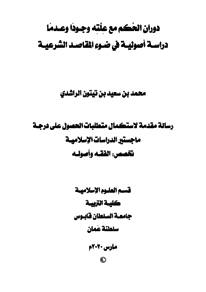وثيقة
دوران الحكم في علته وجوداً وعدماً : دراسة أصولية في ضوء المقاصد الشرعية.
عناوين أخرى
The Ruling's Dependence on the Presence or Absence of Its Effective Cause A Jurisprudential Study in the Light of Shari`ah Objectives
الناشر
جامعة السلطان قابوس.
ميلادي
2020
اللغة
العربية
الملخص الإنجليزي
This is an important jurisprudential study as it attempts to examine the
jurisprudential maxim of "The hukm (ruling)'s dependence on the presence or absence
of its `illah (effective cause)" in the light of shari`ah objectives. The problem this
research approaches is the dialectical relationship between `illah (effective cause),
hikmah (purpose) and maqasid (objectives) in terms of ratiocination in the process of
qiyas (juridical analogy) as expressed by the following maxims: "The ruling depends
on the presence or absence of its `illah", "The ruling depends on the presence or
absence of its hikmah", and "The ruling depends on the presence or absence of its
maqsid". Under this problem, come two main questions: What are the bases for this
maxim "The ruling depends on the presence or absence of its `illah"? What effect
could a maqasid-based perspective have on this maxim? The researcher depends on
four methods in this research: 1) the descriptive method, which is used to identify the
research concepts as well as other relevant issues and rules in a clear way; 2) the
inductive method, which is used to trace the rationale behind various issues; 3) the
comparative method, which is used in comparing between the different opinions of
Muslim jurisprudents and their approaches to the treatment of research issues; and 4)
the critical, analytical method, which is used throughout the research to analyze and
criticize all suggested propositions. The research concludes that the maxim of "the
ruling's dependence on the presence or absence of its effective cause" was laid down
by Muslim jurisprudents and that it was applied by Muslim jurists in their practice of
ijtihad. It is founded on a variety of principles: its juridical legitimacy is derived from
prophetic directives; it is a juridical approach that differs from juridical abrogation;
and it is regulated by the variables and invariables of shari`ah rulings. As for the
maqasid-based perspective, the concepts of shari`ah objectives have been reflected
on this jurisprudential approach and have highlighted its vitality in the contemporary
practice of ijtihad.
المجموعة
URL المصدر
الملخص العربي
تكمن أهمية البحث في كونه دراسة أصولية تبحث المنهج الأصولي المعروف بـ ?دوران الحُكم مع عِلَّتِه وجودًا وعدمًا? في ضوء المقاصد الشرعية، وهدف إلى بيان التقعيدات الأصولية لهذا المنهج الأصولي، وإيضاح أثر المقاصد الشرعية في تجديده، وتتمثل إشكاليته في جدلية التعليل في القياس الأصولي بين العِلَل والحِكَم والمقاصِد، المتمثلة في عبارة ?دوران الحُكم مع عِلَّتِه وجودًا وعدمًا? أو ?دوران الحُكم مع حِكمته وجودًا وعدمًا? أو ?دوران الحُكم مع مقصده وجودًا وعدمًا?، ويندرجُ تحت هذه الإشكالية سؤالان رئيسان، وهما: ما التقعيدات الأصولية لمفهوم ?دوران الحُكم مع عِلَّته وجودًا وعدمًا? في علم أصول الفقه؟ وما أثرُ المقاصد الشرعية في تجديده؟ وسيكتب الباحث هذا البحث معتمدًا بشكل رئيس على أربعة مناهج: المنهج الوصفي؛ إذ سيكشف الباحث ?اعتمادًا عليه- عن دلالات مفاهيم البحث، وما يتصل به من تقعيدات ومسائل؛ بتدوين جميع ما يتعلق به ووصفه وصفًا واضحًا، والمنهج الاستقرائي؛ سيعتمد عليه الباحث في رصد عبارات المنهج، وفي تتبع حيثيات مسائل متعددة، والمنهج المقارن؛ سيظهر في مقارنة أقوال الأصوليين في المسائل ومناهجهم في طرح موضوعات البحث من مختلف المذاهب والاتجاهات، والمنهج التحليلي والمنهج النقدي؛ هذان المنهاجان سيكونان مستصحبين في البحث كله؛ بتفكيك معطياته وتحليلها ومقاربتها ونقدها. وقد توصل البحث إلى أنَّ الأصوليين قعَّدوا لمنهج ?دوران الحُكم مع عِلَّته وجودًا وعدمًا?، وانتهجه الفقهاء في الاجتهاد الفقهي، وقد ابتنى على محاور متعددة، أهمها: كونه مستمدًّا شرعيته الأصولية من أصولٍ نبوية، وكونه منهجًا أصوليًّا مباينًا لمسلك الدوران والنسخ الأصولي، وكونه منضبطًا بضوابط الثابت والمتغير من الأحكام الشرعية. وأمَّا من حيث البعد المقاصدي فقد انعكست مفاهيم مقاصد الشريعة الإسلامية على هذا المنهج الأصولي، وأبرزت حيويته في الاجتهاد الفقهي المعاصر
قالب العنصر
الرسائل والأطروحات الجامعية

